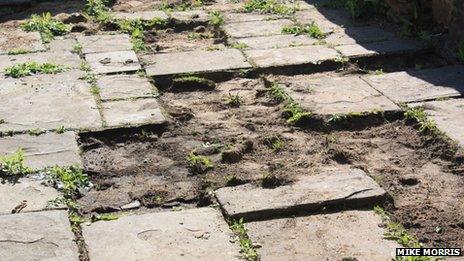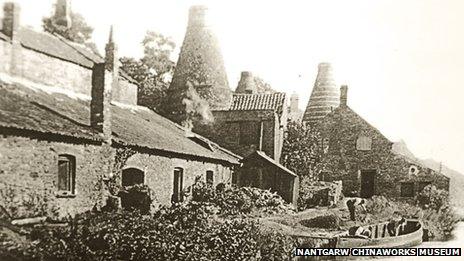Nantgarw Chinaworks Museum's 18th Century paving stones stolen
- Published
Trustee Mike Morris said the slabs were laid when Nantgarw House was built in 1780
Paving slabs dating from the 18th Century have been stolen from a pottery museum in south Wales, with trustees saying they are irreplaceable.
Around 200 stones dating back to 1780 were lifted from Nantgarw Chinaworks Museum, Rhondda Cynon Taf (RCT), sometime on Friday or Saturday.
The museum is the only surviving 19th Century porcelain works in the UK and run by a group of trustees.
South Wales Police are investigating and have appealed for witnesses.
Museum trustee Gwen Griffith says people should contact police if they are offered suspicious stones for their garden
The theft, which has been estimated as costing £10,000, has been condemned by the museum trustees, who are celebrating the 200th anniversary of the porcelain works opening.
The site is leased from RCT council.
Treasurer Mike Morris said: "We are all quite distressed about it. The paving stones are irreplaceable, they are the original slabs. The cost of putting them back would be quite significant."
'Archaeological vandalism'
Mr Morris estimates each 2ft by 1ft paving stone could be worth £50.
He said: "Whoever has done this has made quite a concerted effort to take them. They must have had a big lorry."
The museum does not have outside CCTV but Mr Morris said police officers were checking other footage from the area.

Around 200 stones dating back more than 230 years were lifted
Nantgarw's porcelain became highly prized in London society and aristocratic circles after one time Royal Worcester artist and potter William Billingsley bought the works.
Mr Morris added: "Between 1813 and 1822 Nantgarw produced some of the finest porcelain ever made.
"This archaeological vandalism is a major set back for the trust whose aims include creating a living museum and a centre of excellence for ceramics in south Wales."
The works only produced porcelain for a few years before the factory later switched to making stoneware bottles, earthenware and clay tobacco pipes until it closed in 1920.
South Wales Police officers are checking reclamation sites in Cardiff to see if the stones have been sold on.

Porcelain was produced at the works for only a few years in the early 19th Century